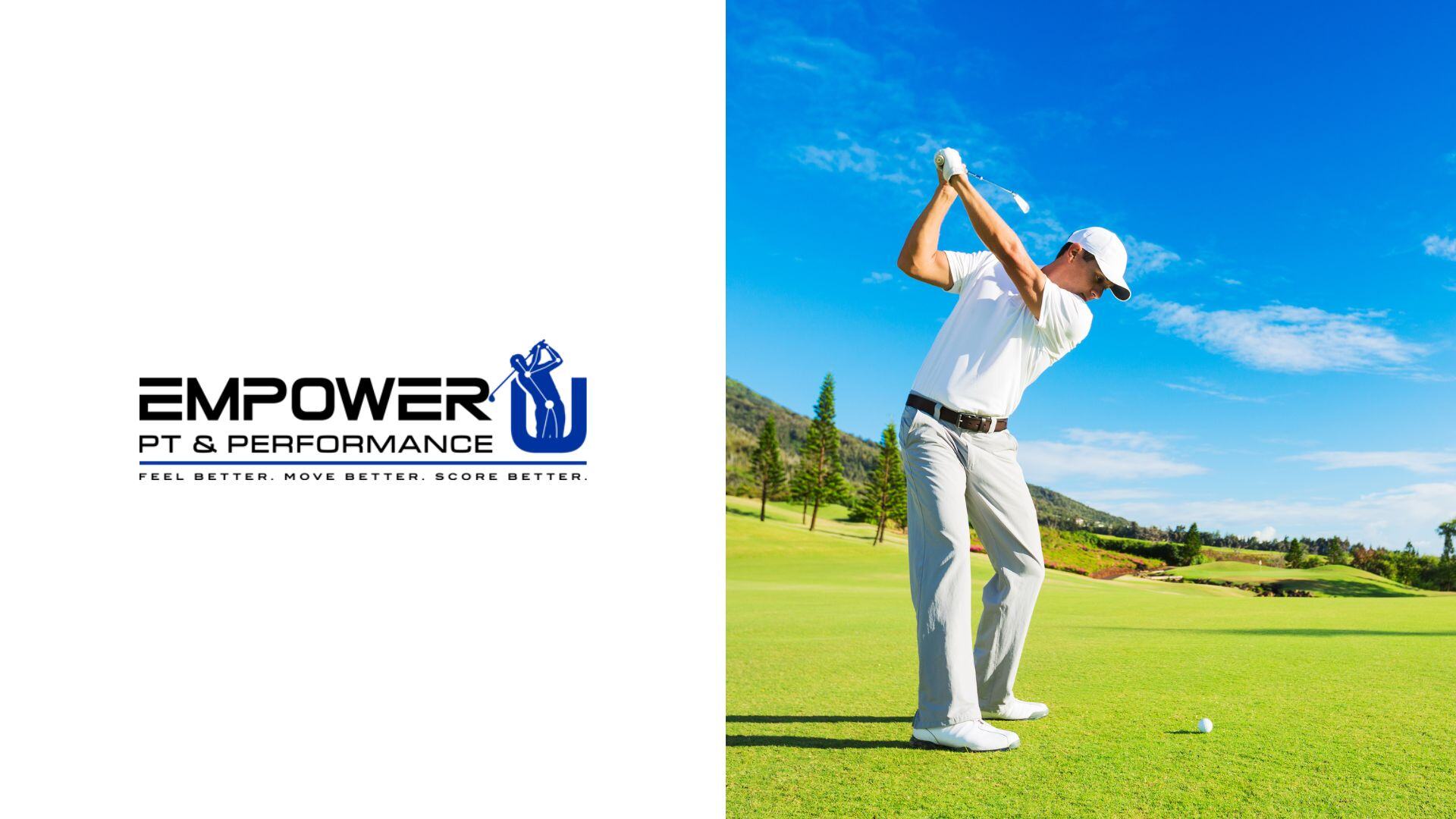A powerful, accurate, and consistent golf swing requires more than just practice—it depends on proper mobility, stability, and body mechanics. Many golfers struggle with restricted movement, poor posture, or muscle imbalances, which can lead to inconsistent shots, reduced power, and even injuries.
TPI-certified physical therapy provides a specialized approach to assessing and improving golf-specific movement patterns. By addressing weaknesses, improving flexibility, and optimizing biomechanics, golfers can enhance swing efficiency, increase distance, and lower their risk of injury.

At Empower U PT and Performance, we use Titleist Performance Institute (TPI) assessments to help golfers fine-tune their movement, maximize power, and play pain-free. This guide explores how golf physical therapy can improve swing mechanics and overall performance.
How Poor Mobility & Stability Affect Your Golf Swing
A smooth, efficient golf swing requires a combination of mobility, stability, and strength. If any of these elements are lacking, golfers may struggle with inconsistent ball contact, reduced power, and increased injury risk.
Also read:
Bridging the Gap between Rehabilitation and the Golf Course
Best Golf Gear to Help Improve Your Game
The Expertise of Physical Therapists for Movement at EmpowerU PT
Key Areas That Impact Swing Mechanics:
- Hip Mobility – Limited hip rotation can restrict backswing and follow-through, leading to compensatory movements that affect accuracy and power.
- Core Stability – A weak core reduces the ability to generate torque, resulting in decreased swing speed and control.
- Shoulder & Thoracic Spine Flexibility – Poor upper-body mobility can lead to an overly arms-driven swing, reducing efficiency and increasing strain on the lower back.
- Balance & Weight Transfer – Instability during weight shifts affects ball-striking consistency and increases stress on the knees and lower body.
When golfers lack mobility or stability in these areas, they often develop compensatory movements that lead to overuse injuries, such as golfer’s elbow, lower back pain, or shoulder strain. Addressing these limitations through golf-specific physical therapy can lead to a smoother, more efficient, and pain-free swing.
What is TPI-Certified Physical Therapy?
The Titleist Performance Institute (TPI) is the leading authority on golf biomechanics, focusing on how the body’s movement affects the golf swing. TPI-certified physical therapists use a specialized movement assessment to identify mobility restrictions, strength deficits, and stability issues that may be limiting swing efficiency.
How TPI Physical Therapy Works:
- Golf-Specific Movement Assessment – Evaluates mobility, flexibility, strength, and balance to identify limitations affecting the swing.
- Swing Fault Analysis – Connects physical limitations to common swing issues, such as early extension, loss of posture, or an over-the-top motion.
- Corrective Exercises & Mobility Drills – Designed to improve hip rotation, spinal flexibility, core stability, and balance for a more controlled and powerful swing.
- Customized Training Plan – Tailored to each golfer’s movement needs, whether they are recovering from an injury or aiming to optimize performance.
By addressing the body-swing connection, TPI-certified physical therapy helps golfers of all levels improve consistency, increase distance, and prevent injuries.
Key Benefits of Golf Physical Therapy for Swing Performance
Golfers often focus on technique and equipment, but body mechanics play a crucial role in swing efficiency and injury prevention. TPI-certified physical therapy helps golfers develop the strength, mobility, and stability needed for an optimized swing.
How Golf Physical Therapy Enhances Performance:
- Increased Power & Distance – Improved hip and thoracic spine mobility allows for a fuller backswing and more torque, generating greater clubhead speed.
- Better Swing Consistency – Strengthening the core, shoulders, and lower body leads to more control and stability throughout the swing.
- Reduced Risk of Injury – Addressing muscle imbalances and joint restrictions minimizes stress on the lower back, elbows, and shoulders.
- Improved Balance & Weight Transfer – Enhancing stability helps golfers maintain proper posture and generate force efficiently from backswing to follow-through.
At Empower U PT and Performance, we use TPI-based movement assessments and individualized training programs to help golfers refine their swing mechanics, play pain-free, and improve overall performance.
Why Choose Empower U PT and Performance for Golf Physical Therapy?
At Empower U PT and Performance, we specialize in TPI-certified physical therapy, helping golfers optimize their swing mechanics, prevent injuries, and improve performance. Whether you’re recovering from an injury or looking to add power and consistency to your game, our customized programs provide the expertise and training you need.
What Sets Us Apart?
- TPI-Certified Expertise – We apply Titleist Performance Institute (TPI) assessments to identify movement inefficiencies affecting your swing.
- Individualized Swing Optimization Plans – Each golfer receives a customized program designed to improve flexibility, stability, and power.
- Injury Prevention & Recovery Strategies – We help golfers recover from chronic pain, mobility restrictions, and overuse injuries to play pain-free.
- Golf-Specific Training & Strength Programs – Our approach integrates mobility work, strength training, and movement drills for long-term improvement.
If you’re looking to enhance your golf swing, prevent injuries, or optimize performance, Empower U PT and Performance can help. Schedule an appointment today and take your game to the next level.




